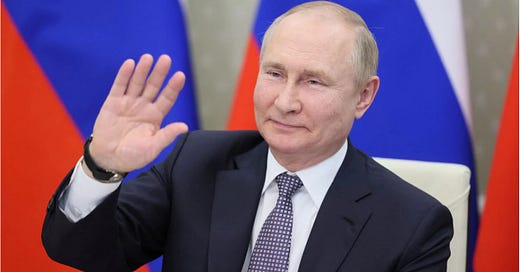The Banality of Putin
If people would quit thinking of him as strange and exotic, Ukraine and the world would be better off.
A few months ago the famous historian Timothy Snyder—whose pithy book On Tyranny became a mega-bestseller during the Trump years—said some things about Vladimir Putin that struck me as strange. Snyder was on Ezra Klein’s podcast, and when Klein asked him how Putin’s view of the world is different from that of people in the US and Europe, he said this:
[Putin] doesn’t care about the things that we think people ought to care about. You know, he doesn’t care about the Russian economy. I don’t think he even cares about Russian interests, perhaps not even the survival of the Russian state. But he does care about other things. And he’s been very clear about those things. He cares about how he’s going to be remembered after he’s dead. He cares about an image of an eternal Russia. He cares about these things which are out of our normal field of view. But that doesn’t make them either rational or irrational. It just means that they are different values.
So Snyder is saying that people in the US and Europe don’t care how they’re going to be remembered after they’re dead? That this kind of concern is “outside our normal field of view,” reflecting “different values”?
And Snyder is saying that Putin “doesn’t care about the Russian economy”—or about “Russian interests” more broadly? The leader of a country is indifferent to how the country is doing under his leadership? He doesn’t care whether his people think he’s doing a good job?
There is a natural tendency, during wars, to depict the leader of the other side as being very different from people on our side. And, of course, different in a bad way: Here is a man who cares deeply about how he’ll be remembered decades from now yet gives no thought to whether his people have enough food today!
This kind of distortion has its upsides and its downsides. On the one hand, depicting the enemy leader as alien, even monstrous, helps keep people riled up about him—and that helps you sustain enough energy to keep up the fight. On the other hand, this depiction warps your view of what’s going on inside his head. And since he’s the guy you’re trying to outmaneuver, it would help to have a clear understanding of his goals and motivations.
I think this is the predicament Ukraine and its allies are now in. The energy level remains high—Ukraine’s will to fight is strong, and the West’s coffers are still open—but the energy is being channeled in questionable ways, in part because the prevailing understanding of what’s going on in Putin’s brain is dim. If this continues—if the war effort keeps being misdirected by misunderstanding—I think catastrophe could ensue.
One misunderstanding about Putin that seems particularly costly is the one underlying Snyder’s characterization of him. Namely: that Putin isn’t guided by the basic political incentives that guide western leaders; he doesn’t worry the way they do about the mundane business of sustaining domestic support.
This misunderstanding is partly a generic one about the leaders we call “dictators” or “autocrats.” We take the etymology of these words too seriously. We think of Putin as someone who rules by himself (auto) and so doesn’t have to concern himself with what other Russian elites think or what the Russian people broadly think; he just sits around giving orders (dictates), indifferent to how they’re viewed even in his own country.
The truth is that dictators are almost always people who care acutely about their level of domestic support (maybe because they know deep down that their legitimacy is dubious). That’s why they spend so much time trying to manipulate public opinion! And, since manipulating public opinion is hard, and completely deceiving your people about reality is even harder, dictators have to care about the real-world consequences of their policies.
In other words: Vladimir Putin is in important respects more like Joe Biden than he is like the caricatures that Snyder and various other American influencers have sketched.
At least, that’s my claim. You don’t have to accept it, but I would ask you to at least indulge me: Let’s assume that Putin, like other national leaders, wants his people to hold him in high regard and see his policies as successful and wise. And let’s evaluate the strategic situation in Ukraine in light of that assumption.
I submit that this simple exercise—based on the not-very-exotic premise that Vladimir Putin is a politician and processes information like one—raises questions about the thinking that seems to be guiding Ukrainian and American policy. I also submit that if we don’t straighten out this thinking, the Ukraine war could end very badly for all concerned.
To put a finer point on it: Failing to think clearly about how things look from Putin’s point of view may be (1) fostering a military strategy in eastern Ukraine that is counterproductive, opening the way for Russian military gains well beyond the east; (2) leading American officials to say things—in public and, anonymously, to journalists—that strengthen Putin’s hand; and (3) leading both Ukrainian and American officials to profess overall war aims that, if actually pursued, could lead to a wider war and even a nuclear war.
I’ll take these in order:



